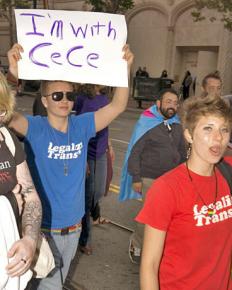Justice for all the CeCes
While CeCe McDonald is finally free, there are many more trans women being victimized, writes , in an article for The Rainbow Times.
THE LONG-awaited day finally arrived January 13, when CeCe McDonald was freed from prison. For those unfamiliar with CeCe's case, she is an African American trans woman from Minneapolis who faced spending the remainder of her life in prison for defending herself against a life-threatening, racist, transphobic attack at the hands of a white supremacist and his fellow thugs.
Thanks to CeCe's incredible bravery, her willingness to speak up and fight, and the hard work of activists to build an international campaign to raise awareness about her case--and demand her release--CeCe was able to take a plea bargain, which reduced her sentence to 17 months. Although CeCe never should have been incarcerated in the first place, let alone in a men's facility, her lessened sentence and subsequent release from prison should be viewed as victory.
As Black transgender actress and trans-rights advocate Laverne Cox explained on Melissa Harris-Perry’s MSNBC program, those who attacked CeCe and worked to throw her in prison were trying to make her invisible, but she didn't let them. CeCe's actions in the face of the nightmare she's been forced to endure over the past two years make her nothing short of a heroine, a queer freedom fighter. Her case provided a national audience with a glimpse into the realities of being a transgender woman of color in American society, and the ugly racism, transphobia and injustice at the core of this country's criminal legal system.

FAR FROM being an exception, CeCe's story is representative of the everyday realities of discrimination, prejudice and abuse that trans women of color experience living at the intersections of interlocking and overlapping systems of oppression. Simply existing in public spaces for trans women means submitting themselves to the threat of bullying, harassment, violence and even murder. As the statistics show, the combination of racism and transphobia has devastating consequences for Black trans women.
Trans women make up 53 percent of those in the LGBTQ community murdered by hate crimes, and 72 percent of those killed are trans women of color. Forty-seven percent of trans people have reported not being able to get a job due to their gender identity and/or presentation. Twenty-six percent of Black trans women report being refused medical services because of their gender identity. Ninety-seven percent of all trans women have experienced harassment at work or in school, and transgender people as a whole are 25 times more likely to commit suicide and 16 times more likely to be murdered than a straight, cisgender person.
Given such disturbing facts, it's no surprise that Black trans women face extreme economic hardships. Forty percent of Black trans women report having been homeless. Thirty-four percent of Black trans women live on less than $10,000 a year--twice the rate of other trans women--and 26 percent report being unemployed. In order to survive in the face of such challenging conditions, more than half of Black trans women report being pushed into sex work or selling drugs to make an income at some point in their life.
CeCe's case, and those of countless other trans women of color, shows that once targeted by the criminal legal system, Black trans women experience nothing short of a nightmare. The growth of the prison industrial complex, the advent of "tough on crime" laws, and the intensification of policing in recent decades have disproportionately affected Black trans women. Compared to other sections of the LGBTQ community, Black trans women experience the brutality of the criminal injustice system at much higher rates.
Seventeen percent of Black trans women have been incarcerated, 38 percent report experiencing police harassment, 15 percent report being physically assaulted by police, and 7 percent sexually assaulted. Once trans women are swept into the criminal injustice system, disrespect and discrimination, whether at the hands of judges, probation officers, lawyers, or prosecutors, are regular features of their experience. CeCe's story isn't the exception to an otherwise fair set-up; it's the norm in a legal system that is rotten and unjust to the core.
UNFORTUNATELY, CECE'S case has not received nearly the amount of attention it deserves from large, mainstream LGBTQ and African American civil rights organizations such as the Human Rights Campaign and the NAACP.
Until CeCe's appearance shortly after her release from prison, alongside Laverne Cox and National Gay and Lesbian Task Force Executive Director Rea Carey on MSNBC's Melissa Harris-Perry, her case was largely neglected by mainstream corporate media outlets. Given the existence of a mass media that, at best, ignores trans women's experiences or, at worst, objectifies and dehumanizes them, the corporate media's blackout on her case is not surprising. However, neglect at the hands of organizations whose purpose is to advocate for the communities they claim to represent is shameful and unacceptable.
Thankfully, Laverne Cox's fierce and passionate advocacy for CeCe in recent months, along with the hard work already done by her supporters, has helped bring greater awareness of her story and the multi-layered oppression that trans women experience, particularly trans women of color, to a larger mainstream audience.
While we should celebrate CeCe's freedom from prison, the struggle for justice is long from over. Not only must we continue to raise awareness about CeCe's story and advocate for trans rights and racial justice, but we must organize to put an end to mass incarceration and the criminal injustice system.
As long as trans women of color continue to be victimized by discrimination, violence, poverty, and incarceration; as long as racial oppression remains embedded in the fabric of our society; and until people all across the sexual and gender spectrums are free to live their lives without fear of being who they are, our fight will continue. We need justice for all the CeCe McDonalds.
First published at The Rainbow Times.


